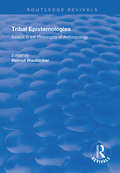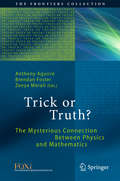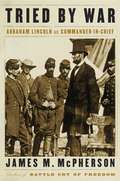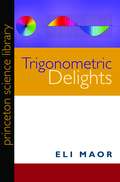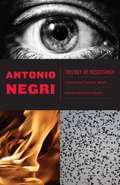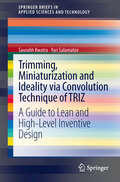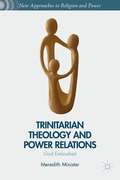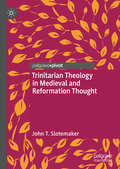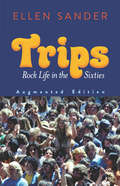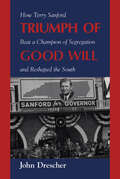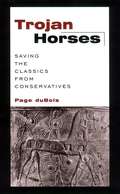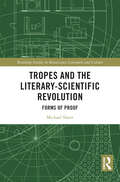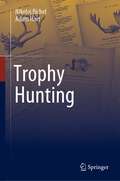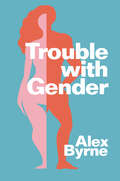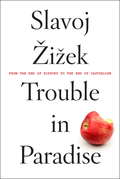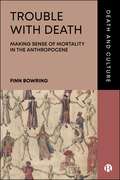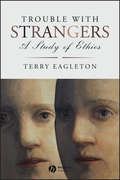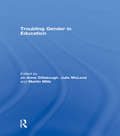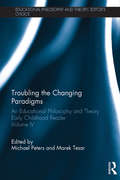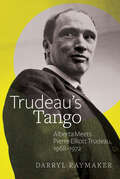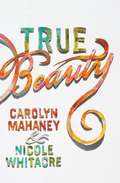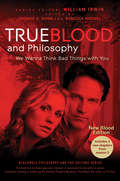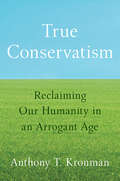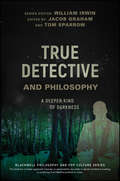- Table View
- List View
Tribal Epistemologies: Essays in the Philosophy of Anthropology (Routledge Revivals)
by Helmut WautischerFirst published in 1998, this collection of ten essays transforms our understanding of both the role of philosophical anthropology in modern world philosophy and the origins of tribal knowledge in their relation to contemporary assessments of cognition and consciousness. Ethnographic data from geographically distant cultures - such as the Maori of New Zealand, the Fore of New Guinea, the Sea Nomads of the Andaman, the Cowlitz of North America, the Maya, Australian Aborigines, Siberian Shamans - are carefully crafted toward an empirical basis for discussing a variety of phenomena traditional labelled in Western thought as transcendent or metaphysical. This anthology is a valuable source of information relevant for any theories of knowledge and a solid challenge for reductionist models of consciousness. The essays enhance our recognition and appreciation of fundamental similarities as well as differences in world views and cultural perspectives related to knowledge claims. This anthology illustrates unplumbed depths of human consciousness, reveals experiential understandings beyond linguistic thought, and stands aside from the view that behaviour and intelligence can be understood by deterministic principles. This volume of essays should be read with stereoscopic vision: one lens focusing on the rich ethnographic material of folk societies, the other focusing on the wider awareness of how we come to know what we know. It features specialists in philosophy, ethnology and comparative sociology, comparative religion, cross-cultural psychology, physical anthropology, environmental and marine scientists, Indian affairs, anthropology, comparative literature, shamanism and theoretical biology. These contributors explore issues including individuality in relational cultures, Maori epistemology, shamanistic knowledge and cosmology and images of conduct, character and personhood in the Native American tradition.
Trick or Truth?
by Anthony Aguirre Brendan Foster Zeeya MeraliThe prize-winning essays in thisbook address the fascinating but sometimes uncomfortable relationship betweenphysics and mathematics. Ismathematics merely another natural science? Or is it the result of humancreativity? Does physics simply wear mathematics like a costume, or is math thelifeblood of physical reality? The nineteen wide-ranging, highly imaginative and oftenentertaining essays are enhanced versions of the prize-winning entries to theFQXi essay competition "Trick or Truth", which attracted over 200 submissions. The Foundational QuestionsInstitute, FQXi, catalyzes, supports, and disseminates research on questions atthe foundations of physics and cosmology, particularly new frontiers andinnovative ideas integral to a deep understanding of reality, but unlikely tobe supported by conventional funding sources.
Tried by War: Abraham Lincoln as Commander in Chief
by James M. McphersonJames McPherson, a bestselling historian of the Civil War, illuminates how Lincoln worked with - and often against - his senior commanders to defeat the Confederacy and create the role of commander in chief as we know it. Though Abraham Lincoln arrived at the White House with no previous military experience (apart from a couple of months spent soldiering in 1832), he quickly established himself as the greatest commander in chief in American history. James McPherson illuminates this often misunderstood and profoundly influential aspect of Lincoln's legacy. In essence, Lincoln invented the idea of commander in chief, as neither the Constitution nor existing legislation specified how the president ought to declare war or dictate strategy. In fact, by assuming the powers we associate with the role of commander in chief, Lincoln often overstepped the narrow band of rights granted the president. Good thing too, because his strategic insight and will to fight changed the course of the war and saved the Union. For most of the conflict, he constantly had to goad his reluctant generals toward battle, and he oversaw strategy and planning for major engagements with the enemy. Lincoln was a self-taught military strategist (as he was a self-taught lawyer), which makes his adroit conduct of the war seem almost miraculous. To be sure, the Union's campaigns often went awry, sometimes horribly so, but McPherson makes clear how the missteps arose from the all-too-common moments when Lincoln could neither threaten nor cajole his commanders to follow his orders. Because Lincoln's war took place within our borders, the relationship between the front lines and the home front was especially close - and volatile. Here again, Lincoln faced enormous challenges in exemplary fashion. He was a masterly molder of public opinion, for instance, defining the war aims initially as preserving the Union and only later as ending slavery - when he sensed the public was at last ready to bear such a lofty burden. As we approach the bicentennial of Lincoln's birth in 2009, this book will be that rarest gift-a genuinely novel, even timely, view of the most-written-about figure in our history. Tried by War offers a revelatory portrait of leadership during the greatest crisis our nation has ever endured. How Lincoln overcame feckless generals, fickle public opinion, and his own paralyzing fears is a story at once suspenseful and inspiring.
Trigonometric Delights
by Eli MaorTrigonometry has always been the black sheep of mathematics. It has a reputation as a dry and difficult subject, a glorified form of geometry complicated by tedious computation. In this book, Eli Maor draws on his remarkable talents as a guide to the world of numbers to dispel that view. Rejecting the usual arid descriptions of sine, cosine, and their trigonometric relatives, he brings the subject to life in a compelling blend of history, biography, and mathematics. He presents both a survey of the main elements of trigonometry and a unique account of its vital contribution to science and social development. Woven together in a tapestry of entertaining stories, scientific curiosities, and educational insights, the book more than lives up to the title Trigonometric Delights.Maor, whose previous books have demystified the concept of infinity and the unusual number "e," begins by examining the "proto-trigonometry" of the Egyptian pyramid builders. He shows how Greek astronomers developed the first true trigonometry. He traces the slow emergence of modern, analytical trigonometry, recounting its colorful origins in Renaissance Europe's quest for more accurate artillery, more precise clocks, and more pleasing musical instruments. Along the way, we see trigonometry at work in, for example, the struggle of the famous mapmaker Gerardus Mercator to represent the curved earth on a flat sheet of paper; we see how M. C. Escher used geometric progressions in his art; and we learn how the toy Spirograph uses epicycles and hypocycles.Maor also sketches the lives of some of the intriguing figures who have shaped four thousand years of trigonometric history. We meet, for instance, the Renaissance scholar Regiomontanus, who is rumored to have been poisoned for insulting a colleague, and Maria Agnesi, an eighteenth-century Italian genius who gave up mathematics to work with the poor--but not before she investigated a special curve that, due to mistranslation, bears the unfortunate name "the witch of Agnesi." The book is richly illustrated, including rare prints from the author's own collection. Trigonometric Delights will change forever our view of a once dreaded subject.
Trilogy of Resistance
by Antonio NegriWith Trilogy of Resistance, the political philosopher Antonio Negri extends his intervention in contemporary politics and culture into a new medium: drama. The three plays collected for the first time in this volume dramatize the central concepts of the innovative and influential thought he has articulated in his best-selling books Empire and Multitude, coauthored with Michael Hardt. In the tradition of Bertolt Brecht and Heiner Müller, Negri&’s political dramas are designed to provoke debate around the fundamental questions they raise about resistance, violence, and tyranny. In Swarm, the protagonist searches for an effective mode of activism; with the help of a Greek-style chorus, she tries on different roles, from the suicide bomber and party apparatchik to the multitude. The Bent Man, set in fascist Italy, focuses on a woodcutter who resists fascism by bending himself in two and using his own now-twisted body as a weapon against war. In Cithaeron, perhaps the most audacious of the three plays, Negri reworks Euripides&’s Bacchae to explore the circumstances that would compel a diverse and creative community to withdraw from both the despotic government that constrains it and the traditional family relationships that reinforce that despotism.First published in France in 2009 and featuring an introduction by Negri, Trilogy of Resistance provides a direct and passionate distillation of Negri&’s concepts and offers insights into one of the most important projects in political philosophy currently under way, as well as a timely reminder of the power of theater to effectively dramatize complex and challenging ideas.
Trimming, Miniaturization and Ideality via Convolution Technique of TRIZ
by Saurabh Kwatra Yuri SalamatovThe book is a valuable research tool-kit for innovators, amateur & professionals alike. Additionally, College & University faculties on Engineering, who organize yearly workshops internationally will find hundreds of novel themes to choose from. Some teachers might just secretly buy this book to introduce out-of-box brain-teasers in classroom to add fizz to normal (at times boring) lecturing. The book can be used as main/add-on textbook towards following courses: (1) Master's degree programs on design innovation worldwide and (2) Senior undergraduate courses in industrial, engineering & product design.
Trinitarian Theology and Power Relations
by Meredith MinisterThis text crafts a trinitarian theology that reorients theology from presumptions about the immateriality of the Trinity toward the places where the Trinity matters--material bodies in historical contexts and the intersecting ways political and theological power structures normalize and marginalize bodies on the basis of material difference.
Trinitarian Theology in Medieval and Reformation Thought
by John T. SlotemakerThis book is an introduction to trinitarian theology as it developed from the late medieval period. John T. Slotemaker presents an overview of the central aspects of trinitarian theology by focusing on four themes: theological epistemology, the emanations in God, the divine relations, and the Trinity of persons. He does so by exploring a broad range of theological opinions on each subject and delineating the options that existed for medieval theologians from the early thirteenth century through the sixteenth. He argues that despite the diversity of opinion on a given subject, there is a normative theological center that grounds late medieval trinitarian theology. This center consists of theological developments involving the adoption of Peter Lombard’s Sentences as a theological textbook, the conciliar decisions of Lateran IV, and a shared Aristotelian philosophical background of Western trinitarian theology.
Trips: Rock Life in the Sixties—Augmented Edition
by Ellen Sander"Simply one of the best pieces of rock reportage ever written." — Los Angeles Review of BooksAs a pioneering rock journalist for Hit Parader, Vogue, Saturday Review, and other publications, Ellen Sander had a backstage pass to the hottest music scenes of the 1960s. In this feast of juicy anecdotes and keen social commentary, she draws upon her professional and personal experiences to chronicle pop culture's highs and lows during the turbulent decade. Join her for weird and wild road trips with companions ranging from Yippies to the members of Led Zeppelin. Stops along the way include the folk music clubs of Greenwich Village, Haight-Ashbury in its riotous heyday, and the euphoric festivals at Monterey and Woodstock."It is a memoir, a sourcebook, and a love letter," Sander writes, "a recollection of a time, parenthesized by ambivalence and apathy, a search for the ultimate high, a generation with an irrepressible vision, its art, artists, its audience, and the substance of its statement." This expanded edition of Trips adds "The Plaster Casters of Chicago," Sander's seminal piece on groupie culture, the lengthy "Concerts and Conversations," as well as a new Preface and chapter postscripts.
Triumph of Good Will: How Terry Sanford Beat a Champion of Segregation and Reshaped the South
by John DrescherIn the spring of 1960 two talented, capable men, each with great passion and conviction, opposed each other in a pivotal governor's race that was to shake North Carolina and change southern politics forever. Both Terry Sanford and I. Beverly Lake were Democrats in the one-party South of that era. Yet they were different in almost every other way. Lake, a middle-aged law professor, was committed to segregation. Sanford, an ambitious young politician and lawyer, believed in expanding opportunities for all citizens. In their run-off Lake wanted the contest to be a referendum on preserving segregation. Sanford's platform rested on the improvement of public schools. It was a heated struggle that would bind them together for the rest of their lives. With unparalleled access to both sides and an objective correspondent's hindsight view, John Drescher has written the biography of a campaign that set the winning strategy for many who followed, and of a winning candidate, a governor rated as one of the finest of the twentieth century. Sanford, the moderate, won, and his victory is an oddity, for in the civil rights period from 1957 to 1973 only twice in the South did racial moderates defeat strong segregationists in a governor's race. In a gamble that almost cost Sanford the election, he became the first major politician in the Bible Belt to endorse the Catholic John F. Kennedy for president. In the November vote he defeated his Republican opponent in what was then the closest North Carolina governor's race of the century. His win validated his belief in the triumph of good will among North Carolina's people. Sanford became a bold, aggressive governor of unusual energy and creativity. His school program added teachers and dramatically raised teacher pay. He helped establish a statewide system of community colleges and started an anti-poverty fund later emulated by LBJ as a model for the War on Poverty. He was the first southern governor to call for employment without regard to race or creed. Sanford became the model for other southern governors who stressed education and a moderate stand on race relations. He influenced other gubernatorial candidates across Dixie -- Jim Hunt in his own state, William Winter in Mississippi, Dick Riley in South Carolina, Bill Clinton in Arkansas. The effects of that 1960 race continue to be felt in North Carolina, in the South, and across the nation.
Triviale Einsichten, die niemand befolgt: Wissenschaftliche und philosophische Erkenntnisse zu alltäglichen Fragen
by Jürgen BeetzWarum ist ein „Wirtschaftsweiser“ für Mindestlöhne und ein anderer dagegen? Wieso verfangen wir uns in ergebnislosen Diskussionen oder albernen Paradoxien, fallen auf die „Spielchen“ unserer Mitmenschen herein, verkennen Ursache und Wirkung, verwechseln Zufall und Vorbestimmung? Weshalb denken wir so und handeln anders? Sagen wir, was wir meinen oder meinen wir viel mehr oder etwas ganz anderes, als wir sagen? Wieso entstehen neue Systeme mit meist unerwarteten Eigenschaften „von selbst“? Wie entsteht eine neue Qualität durch eine veränderte Quantität? Dieses Buch zeigt, dass Philosophie, die „Liebe zur Weisheit“, auch im Alltag viele Probleme lösen und Handlungsanweisungen liefern kann. Dabei sind es oft „triviale Einsichten“, die uns einen Schritt voran bringen: Erkenntnisse, die wir schon längst haben oder durch ein wenig Nachdenken erlangen könnten, die wir aber einfach nicht beherzigen – aus vielfältigen Gründen, die hier ausführlich untersucht werden, mit dem Ziel, sie zu überwinden. Hier gehen Hirnforschung, Naturwissenschaften, Psychologie und Philosophie nebst einer Prise (Selbst-)Ironie eine interessante und amüsante Verbindung ein. Uns begegnen auf dieser Exkursion Paradoxien, die menschliche Evolution, zyklische Prozesse und seltsame Schleifen, Wahrnehmungstäuschungen, vernetzte Systeme und Regelkreise – schließlich das Chaos und die „objektive“ Wahrheit. Die Leser lernen, Querverbindungen und Zusammenhänge zu erkennen, die sie bisher nicht gesehen haben. Einfache Erkenntnisse werden erneut ins Gedächtnis gerufen. Wir entdecken offensichtliche Vorteile beim Gebrauch des Verstandes und vermeiden die kleinen aber tückischen Fallen des Alltags: fruchtlose Schwarz-/Weiß-Diskussionen, verborgene Zwickmühlen innerer Widersprüche, kostspieligen Aberglauben oder schädliche Psycho-Spiele. Also lautet die Devise: „Benutze deinen Verstand!“
Trojan Horses: Saving the Classics from Conservatives
by Page DuBoisA passionate reexamination of the ancient world and the lessons we can draw from antiquityIn today’s turbulent cultural moment, it is all too common for conservatives to invoke the wisdom of the ancient Greeks in the name of timeless virtues. At the same time, critics have charged that multiculturalists have hopelessly corrupted the study of antiquity itself, and that the teaching of Classics is dead.Trojan Horses is Page duBois's answer to scholars and theorists—such as Camille Paglia, Allan Bloom, and William Bennett—who have appropriated antiquity in the service of a conservative political agenda. She challenges cultural conservatives' appeal to the authority of the Classics by revealing their presentation of ancient Greece as simplistic, ahistorical, and irreparably distorted by their politics. In its devastating critique of these pundits, Trojan Horses presents a more complex and more accurate view of ancient Greek politics, sex, and religion. In her incisive examinations of figures such as Daedalus and Artemis, duBois eloquently conveys their complexity and passion, but also unearths actions and beliefs that do not square so easily with today's conservative values. As duBois writes, "Like Bennett, I think we should study the past, but not to find nuggets of eternal wisdom. Rather we can comprehend in our history a fuller range of human possibilities, of beginnings, of error, and of difference."In these chapters, duBois offers readers a view of the ancient Greeks that is more nuanced, more subtle, more layered and in every way more historical than the portrait many of today’s scholars strive to display in our classrooms. Sharp, timely, and engaging, Trojan Horses portrays the richness of ancient Greek culture while riding in to rescue the Greeks from the new barbarians.
Tropes and the Literary-Scientific Revolution: Forms of Proof (Routledge Studies in Renaissance Literature and Culture)
by Michael SlaterTropes and the Literary-Scientific Revolution: Forms of Proof argues that the rise of mechanical science in the seventeenth century had a profound impact on both language and literature. To the extent that new ideas about things were accompanied by new attitudes toward words, what we commonly regard as the “scientific revolution” inevitably bore literary dimensions as well. Literary tropes and forms underwent tremendous reassessment in the seventeenth century, and early modern science was shaped just as powerfully by contest over the place of literary figures, from personification and metaphor to anamorphosis and allegory. In their rejection of teleological explanations of natural motion, for instance, early modern philosophers often disputed the value of personification, a figural projection of interiority onto what was becoming increasingly a mechanical world. And allegory—a dominant mode of literature from the late Middle Ages until well into the Renaissance—became “the vice of those times,” as Thomas Rymer described it in 1674. This book shows that its acute devaluation was possible only in conjunction with a distinctively modern physics. Analyzing writings by Sidney, Shakespeare, Bacon, Jonson, Brahe, Kepler, Galileo, Hobbes, Descartes, and more, it asserts that the scientific revolution was a literary phenomenon, just as the literary revolution was also a scientific one.
Trophy Hunting
by Adam Hart Nikolaj BichelThis book gets to the heart of trophy hunting, unpacking and explaining its multiple facets and controversies, and exploring why it divides environmentalists, the hunting community, and the public. Bichel and Hart provide the first interdisciplinary and comprehensive approach to the study of trophy hunting, investigating the history of trophy hunting, and delving into the background, identity and motivation of trophy hunters. They also explore the role of social media and anthropomorphism in shaping trophy hunting discourse, as well as the viability of trophy hunting as a wildlife management tool, the ideals of fair chase and sportsmanship, and what hunting trophies are, both literally and in terms of their symbolic value to hunters and non-hunters. The analyses and discussions are underpinned by a consideration of the complex moral and practical conflicts between animal rights and conservation paradigms. This book appeals to scholars in environmental philosophy, conservation and environmental studies, as well as hunters, hunting opponents, wildlife management practitioners, and policymakers, and anyone with a broad interest in human–wildlife relations.
Trouble With Gender: Sex Facts, Gender Fictions
by Alex ByrneSex used to rule. Now gender identity is on the throne. Sex survives as a cheap imitation of its former self: assigned at birth, on a spectrum, socially constructed, and definitely not binary. Apparently quite a few of us fall outside the categories ‘male’ and ‘female’. But gender identity is said to be universal – we all have one. Humanity used to be cleaved into two sexes, whereas now the crucial division depends on whether our gender identity aligns with our body. If it does, we are cisgender; if it does not, we are transgender. The dethroning of sex has meant the threat of execution for formerly noble words such as ‘woman’ and ‘man’. In this provocative, bold, and humane book, the philosopher Alex Byrne pushes back against the new gender revolution. Drawing on evidence from biology, psychology, anthropology and sexology, Byrne exposes the flaws in the revolutionary manifesto. The book applies the tools of philosophy, accessibly and with flair, to gender, sex, transsexuality, patriarchy, our many identities, and our true or authentic selves. The topics of Trouble with Gender are relevant to us all. This is a book for anyone who has wondered ‘Is sex binary?’, ‘Why are men and women different?’, ‘What is a woman?’ or, simply, ‘Where can I go to know more about these controversies?’ Revolutions devour their own children, and the gender revolution is no exception. Trouble with Gender joins the forefront of the counter-revolution, restoring sex to its rightful place, at the centre of what it means to be human.
Trouble in Paradise
by Slavoj ZizekIn Trouble in Paradise, Slavoj i ek, one of our most famous, most combative philosophers, explains how we can find a way out of the crisis of capitalism. There is obviously trouble in the global capitalist paradise. But why do we find it so difficult to imagine a way out of the crisis we're in? It is as if the trouble feeds on itself: the march of capitalism has become inexorable, the only game in town. Setting out to diagnose the condition of global capitalism, the ideological constraints we are faced with in our daily lives, and the bleak future promised by this system, Slavoj i ek explores the possibilities--and the traps--of new emancipatory struggles. Drawing insights from phenomena as diverse as "Gangnam Style" to Marx, The Dark Knight to Thatcher, Trouble in Paradise is an incisive dissection of the world we inhabit, and the new order to come.From the Hardcover edition.
Trouble with Death: Making Sense of Mortality in the Anthropocene (Death and Culture)
by Finn BowringAre we accepting of death, or in denial of it? What insights can we gain from the ways death has been imagined, theorized, and organized throughout Western social and intellectual history that might help us respond meaningfully to the climate emergency? This interdisciplinary study begins with the role of tragedy in Greek antiquity and examines European attitudes toward death, especially their entanglement with colonial atrocities and politically organized killings. Drawing on the work of philosophers, sociologists, historians, and psychoanalysts, this is a resounding call to confront our responsibility for the lives of others—and the future of life itself—amid the existential threats of the Anthropocene.
Trouble with Strangers: A Study of Ethics
by Terry EagletonIn this major new book, Terry Eagleton, one of the world’s greatest cultural theorists, writes with wit, eloquence and clarity on the question of ethics. Providing rare insights into tragedy, politics, literature, morality and religion, Eagleton examines key ethical theories through the framework of Jacques Lacan’s categories of the Imaginary, the Symbolic and the Real, measuring them against the ‘richer’ ethical resources of socialism and the Judaeo-Christian tradition. a major new book from Terry Eagleton, one of the world’s greatest cultural theorists investigates ethical theories from Aristotle to Alain Badiou and Slavoj Žižek engages with the whole modern European tradition of thought about ethics brings together personal and political ethics and makes a passionate case for political love
Troubling Gender in Education
by Martin Mills Julie McLeod Jo-Anne DillaboughThis book explores new questions and lines of analysis within the field of ‘gender and education’, conveying some of the style and diversity of contemporary research directions. It celebrates as well as assesses the achievements of feminist work in education, acknowledging this legacy while also ‘troubling’ and opening up for critical reflection any potential stalemates and sticking points in research trends on gender and education. The collection has a strong cross-cultural focus, with chapters exploring experiences of students and teachers in the UK, the US, Australia, Canada, Hawaii and South Africa. The chapters examine topics relevant to both boys’ and girls’ education and to forms of education which span different sectors and both informal and formal spaces. Issues examined include citizenship and belonging, affect, authority and pedagogy, sexuality and the body, racism, and national identity and new and emerging forms of masculinity and femininity. Across these varied terrains, each of the authors engages with theoretical work informed by a broad range of disciplinary and interdisciplinary approaches from across the social sciences and humanities, drawing variously from postcolonial, queer, and new sociological theories of modernity and identity, as well as from fields such as cultural geography and narrative studies. This collection of thought-provoking essays is essential reading for scholars and graduate students wanting to understand the current state of play on research and theory on ‘gender and education’.This book was published in a special issue of Discourse: Studies in the Cultural Politics of Education.
Troubling the Changing Paradigms: An Educational Philosophy and Theory Early Childhood Reader, Volume IV (Educational Philosophy and Theory: Editor’s Choice)
by Michael A. Peters Marek TesarTroubling the Changing Paradigms is the fourth volume in the Educational Philosophy and Theory: Editor’s Choice series and represents a collection of texts that were selected as representations of the philosophy and pedagogy of early years, childhood and early childhood education. The philosophy of the early years is complex, and this book demonstrates how this fascinating subject can be interlinked with both the philosophy and history of education as being instrumental in shaping the child subject, childhoods and children’s educational futures. This book demonstrates the application of philosophical and theoretical perspectives that provide us with global and local narratives and understandings of children as subjects, and their subjectivities. The philosophical traditions offer new spaces in which to think about alternative childhoods, and contribute to an important analysis in which philosophy has the capacity to shape children’s lives and education, and to elevate the multiplicity of discourses around very young children and their education and care. Through the texts in this volume, the authors aim to find creative philosophical forms that are capable of interrupting, if not disrupting, traditional and, in some settings, perhaps more conventional discourses about children and their childhoods. These philosophical forms present productive ways that allow fresh conceptions of what is all too often an assumed set of subjectivities and experiences about very young children. Troubling the Changing Paradigms will be key reading for academics, researchers and postgraduate students in the fields of philosophy of education, philosophy, education, educational theory, post-structural theory, the policy and politics of education, and the pedagogy of education.
Trudeau's Tango: Alberta Meets Pierre Elliott Trudeau, 1968–1972
by Darryl RaymakerA chronicle of Pierre Elliot Trudeau’s first term as prime minister and the attempt to bridge one of Canada’s classic political fault lines.Trudeau appeared to enjoy the encounter. He stood his ground while escaping projectiles, including a tomato . . .In this insightful and lively history, Liberal insider Darryl Raymaker recalls the attempt to broker “a marriage from hell” between the federal Liberal Party and Alberta’s Social Credit government in the late 1960s. Raymaker uses his deep connections and backroom knowledge to trace the tangled political relationships that developed when charismatic statesman Pierre Trudeau confronted the forces of oil and agriculture in Canada’s west. Part memoir, part chronicle, Trudeau’s Tango provides a window into Canadian history, politics, economics and the zeitgeist of the late 1960s.“Trudeau’s Tango is part memoir, part documentary of the geographic, cultural and political divisions that are a permanent fixture of Confederation. The fact we held it together remains a world-class achievement. . . . Compelling reading for any Canada 150 book club . . . A fresh and lively account of politics with sharp elbows.” —Holly Doan, Blacklock’s Reporter“An excellent book about Alberta and the Trudeaus.” —Warren Kinsella, HuffPost“[Raymaker’s] book recalls a tumultuous political era with wry humour and a touch of anger.” —Frank Dabbs, Alberta Views“A detailed chronology of the history and tangled political relationships of the Liberal Party at the national and provincial levels and its opponents in Alberta—the once dominant Social Credit Party and then the Progressive Conservatives—from December 1967 through November 1972. The account is filled with blow-by-blow descriptions of political events and encounters at the provincial level. . . . Recommended.” —G.A. McBeath, CHOICEMagazine
True Beauty
by Carolyn Mahaney Nicole WhitacreWhat Is True Beauty? Whether it's age-defying makeup or the latest diet fad, our culture continually tells women that beauty consists of flawless skin and a supermodel figure. In True Beauty, Carolyn Mahaney and her daughter Nicole Whitacre direct us to the truth of God's Word, where we encounter an entirely different--and refreshingly liberating--standard of beauty. Offering a path to freedom from the false idols that society, the Devil, and our sinful hearts so often create, this encouraging book will help you to exchange the temporary glamour of pop culture for the unfading beauty of godliness.
True Blood and Philosophy: We Wanna Think Bad Things With You (The Blackwell Philosophy and Pop Culture Series #48)
by William IrwinNEW BLOOD EDITION: Contains three new chapters from Season 3. This new edition is available as an E-BOOK ONLY and contains three chapters not found in the print book! The first look at the philosophical issues behind Charlaine Harris's New York Times bestsellers The Southern Vampire Mysteries and the True Blood television series! Teeming with complex, mythical characters in the shape of vampires, telepaths, shapeshifters, and the like, True Blood, the popular HBO series adapted from Charlaine Harris's bestselling The Southern Vampire Mysteries, has a rich collection of themes to explore, from sex and romance to bigotry and violence to death and immortality. The goings-on in the mythical town of Bon Temps, Louisiana, where vampires satiate their blood lust and openly commingle with ordinary humans, present no shortages of juicy metaphysical morsels to sink your teeth into. Now True Blood and Philosophy calls on the minds of some of history's great thinkers to perform some philosophical bloodletting on such topics as Sookie and the metaphysics of mindreading; Maryann and sacrificial religion; werewolves, shapeshifters and personal identity; vampire politics, evil, desire, and much more. The first book to explore the philosophical issues and themes behind the True Blood novels and television series Adds a new dimension to your understanding of True Blood characters and themes The perfect companion to the start of the third season on HBO and the release of the second season on DVD Smart and entertaining, True Blood and Philosophy provides food -- or blood -- for thought, and a fun, new way to look at the series.
True Conservatism: Reclaiming Our Humanity in an Arrogant Age
by Anthony T. KronmanDrawing on the riches of the Western tradition, Anthony T. Kronman defends a humane conservativism for our enlightened age As the party of the left has grown more strident, its conservative critics have responded in kind. Each year conservatives do a poorer job of defending their position as a citadel of human values without lapsing into an angry assault on ideals that they and progressives share. It becomes harder to see the enduring appeal of a true conservatism that celebrates the worth of custom and inheritance; the splendor of what is excellent and rare; the expansive solidarity of our friendship with the dead; and the dignity, indeed necessity, of our longing for a connection to the eternal and divine—while affirming that these timeless human goods are compatible with the modern ideals of equality, toleration, and reasoned argument. In this bracing book, Anthony Kronman defends a conservative philosophy of life that respects our enlightened ideals but decries the damage their arrogant simplification causes in our moral, political, and spiritual lives. Drawing on the work of Aristotle, Cicero, Spinoza, Burke, Hume, Madison, Tocqueville, Lincoln, Arendt, Heidegger, and others, he argues that humanism is conservatism, today as in the past. He reminds us that our humbling parameters make possible every form of human greatness, every human glory, every human love worthy of the name.
True Detective and Philosophy: A Deeper Kind of Darkness (The Blackwell Philosophy and Pop Culture Series)
by William IrwinInvestigating the trail of philosophical leads in HBO’s chilling True Detective series, an elite team of philosophers examine far-reaching riddles including human pessimism, Rust’s anti-natalism, the problem of evil, and the ‘flat circle’. The first book dedicated to exploring the far-reaching philosophical questions behind the darkly complex and Emmy-nominated HBO True Detective series Explores in a fun but insightful way the rich philosophical and existential experiences that arise from this gripping show Gives new perspectives on the characters in the series, its storylines, and its themes by investigating core questions such as: Why Life Rather Than Death? Cosmic Horror and Hopeful Pessimism, the Illusion of Self, Noir, Tragedy, Philosopher-Detectives, and much, much more Draws together an elite team of philosophers to shine new light on why this genre-expanding show has inspired such a fervently questioning fan-base
